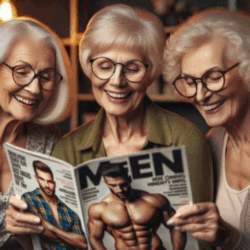Historically, Black women have been branded with labels alluding to the “super pussy.” Yes, history and its sociocultural constructs under a white gaze have endowed us with a titanic sexual force that keeps us in the sights of others’ hunger… And what can we say about the negative way in which our skin and hair color are viewed, which adds to the rampant structural racism that turns us into an “exotic and fiery thing…”

I am a 42-year-old woman of African descent. I write erotic poetry, and even from my most intimate circles, I have been asked questions that I never thought I would have to confront as consciously as I do today. I could certainly ignore every single time I’ve been asked questions about the size of my vulva, the depth of my vagina, or even the duration of my sexual encounters, but no. I don’t feel like keeping silent. I believe that if these stereotypes have become entrenched in the minds of those who go around spewing their fallacious imagery left and right, it is my direct responsibility to refute and demand explanations from those who dare to ask me questions. That is why I write to the body; I do so to reclaim pleasure from normality, from a corporality that feels and vibrates with the naturalness produced by the appropriate stimuli.
Racial sexual stereotypes are the result of a historical process of social, political, and ideological character that has been internalized through various socialization processes. These hypersexualized stereotypes, as depicted in content like free Nigerian XXX, affect the free exercise of our sexuality. As Black women, the effort triples, and, whether we like it or not, social pressure is felt and inhibits us, as we are required, through supply and demand, to perform a specific form of sexual performance, associated with a passion and willingness that interfere with our autonomy and capacity for reflection.
It’s clear that these judgments persist over time, due to the imaginary and its idealized construction around the figure of the Black woman. Images that have become cognitively fixed in the collective imagination, becoming “truths” that cannot be proven. That is, self-imposed representations of others or of oneself. Let’s start from the premise that the term race is a construct created to establish social hierarchies. Audrey Smedley said: “Race is a systematic, culturally structured way of looking at, perceiving, and interpreting reality.”
We are all made the same, with the same number of organs in our bodies and the same abilities. What is clear is that, culturally, we are permeated by different customs, and that there are unique characteristics that distinguish us from one another. However, all of these are not necessarily linked to marathons of endless intimate encounters, nor to a vaginal species with super powers of suction and enchantment, as I have had the opportunity to hear in sing-song tones from men and women from different social strata I have encountered. It is worth noting that, for a long time, other bodies have been talking about us, as if they knew us. On the other hand, I dare say that all Black men and women in the world are born with an artistic sensibility that comes from our cradle. Our ancestry has left us as a legacy of rhythm, colors, and that carefree way in which we face life; it is an organic matter that transcends joviality.
Black women who experienced the oppression and ignominy of being enslaved never shed what made them collectively powerful: singing, dancing, being, and existing. For this reason and many more, I refuse to give up my share of sensuality; I refuse to stop feeling the effect of the music that moves through me when it plays and that takes over the movement of my hips. I refuse to stop showing off my figure, and, above all, I refuse to be me.
It is important to emphasize that all these sexual stereotypes are not only embedded in the imaginations of white and mixed-race women and men, but also exist and are recreated as beliefs held by Black women and men, transforming them into a form of physical good (the body) in the sphere of desire. Let us ask ourselves: Why are stereotypes assumed? Perhaps one way to explain the experiences of stereotypical practices is the desire to fit into an expected behavior and therefore to attach itself to a collective identity, which nevertheless provides a place, even if it is not the most prestigious socially speaking. This is not about ignoring people’s sexual qualities. It is possible that many Black women have sexual experiences similar to those “expected.” However, it must be emphasized that these experiences are not natural; that is, they are not a phenotypic condition.





